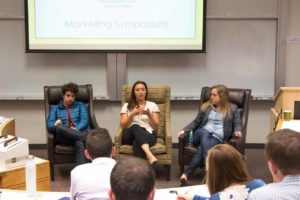By Kara Sherrer
While Vanderbilt Business already hosted a Brand Symposium earlier in the fall, the Owen Marketing Association (OMA) recently coordinated an additional event, the Marketing Symposium, to give MBA and Master of Marketing students an even broader picture of the jobs available in marketing.
Earlier this month, OMA welcomed three alumni back for the Marketing Symposium: Hana Elliott (MBA’10), Director of Marketing at Ambition; Alan Mitchell (MBA’16), Product Marketing Manager at Google Fiber; and Danielle Piergallini (MBA’12), Team Lead for Small/Medium Businesses at American Airlines. Here are their must-know tips for launching a career in marketing after business school:
You’ll have lots of marketing resources available.

Photo courtesy of the Raleigh Murals Project
Of course, marketers of all stripes still have access to traditional methods of advertising, but these channels are becoming more expensive and less effective as consumer tastes shift. This means that marketers are often experimenting with new methods to see what succeeds and what doesn’t. “For me, (I enjoy) the number of levers I have available to pull,” Mitchell explained, citing a new augmented reality mural he recently had painted in downtown Raleigh for Google Fiber. “I can layer on these cool ways to supplement these traditional methods (of marketing).”
Be prepared to learn on the job.
Of course, the business school curriculum gives students a strong foundation in marketing, especially if they’re a career switcher coming from a non-marketing background. However, because the field is constantly changing and evolving, graduates who want to get a marketing role should expect to keep learning and growing in whatever position they accept. “Everyone is going to learn on the job, whether you’re experienced or not,” Piergallini said. “I feel like I learned 95% of marketing-specific stuff on the job,” Elliott added jokingly.
Communicate well with non-marketers.
In business school, you’ll naturally spend a lot of time with people who also want to pursue careers in marketing, since you’ll be taking classes and working in groups with them. However, the panelists urged attendees to also work with students from other concentrations such as finance and operations, since marketing professionals often work on cross-discipline teams in the real world. “I spend a lot of time talking to finance people these days,” Mitchell said.
Data analysis is a critical skill to have.

From left to right: Mitchell, Elliot, and Piergallini
While creativity is certainly required to be successful in the field, marketing decisions are increasingly driven by data analysis. Marketers who can be creative and analyze data are becoming more and more valuable, which is why the panelists encouraged attendees to take as many modeling and survey classes as they could while still in school. In fact, Piergallini taught herself how to use SQL and Tableau databases precisely because she wanted to know how to analyze data on her own. “If you have the ability to report your own data…you have more of an ability to move the needle,” she explained.
Know how to connect your experience to marketing.
When it comes to interviewing for internships and jobs, the alumni said that they usually look for a candidate’s thoughtful approach to marketing, even if the students don’t have direct work experience in the field yet. “I care more about someone’s thought process than about their specific tactical experience,” Elliott said. Piergallini advised that students think about how class projects are relevant to interviews if they don’t have work experience. “How can you take your experiences that you do have and turn them into appropriate answers for the questions that are being asked?” she said.
Want to learn more about Marketing at Vanderbilt Business? Visit our MBA program page or our Master of Marketing program page.